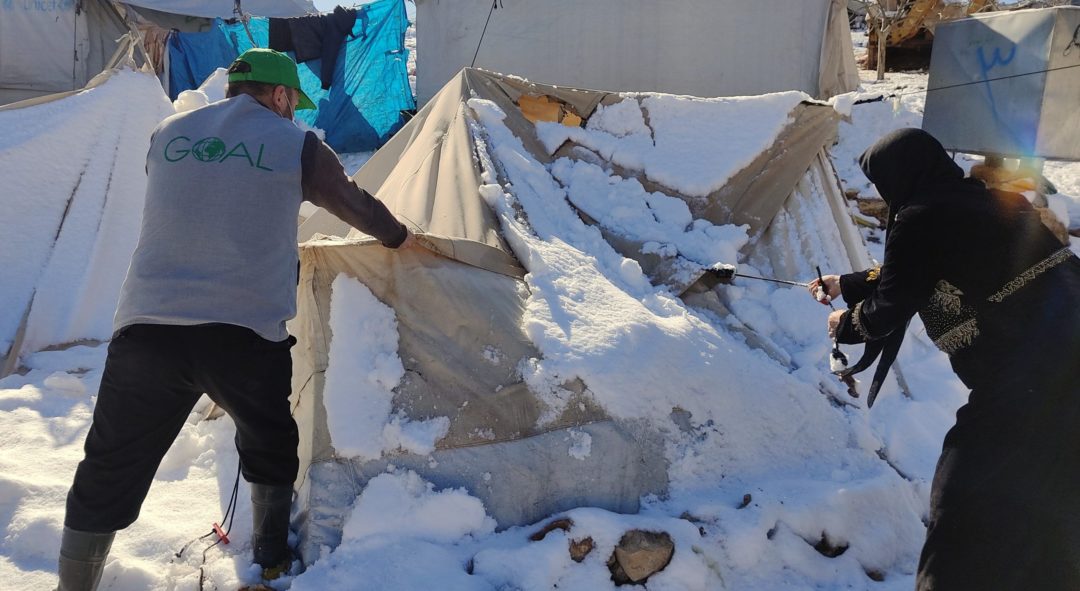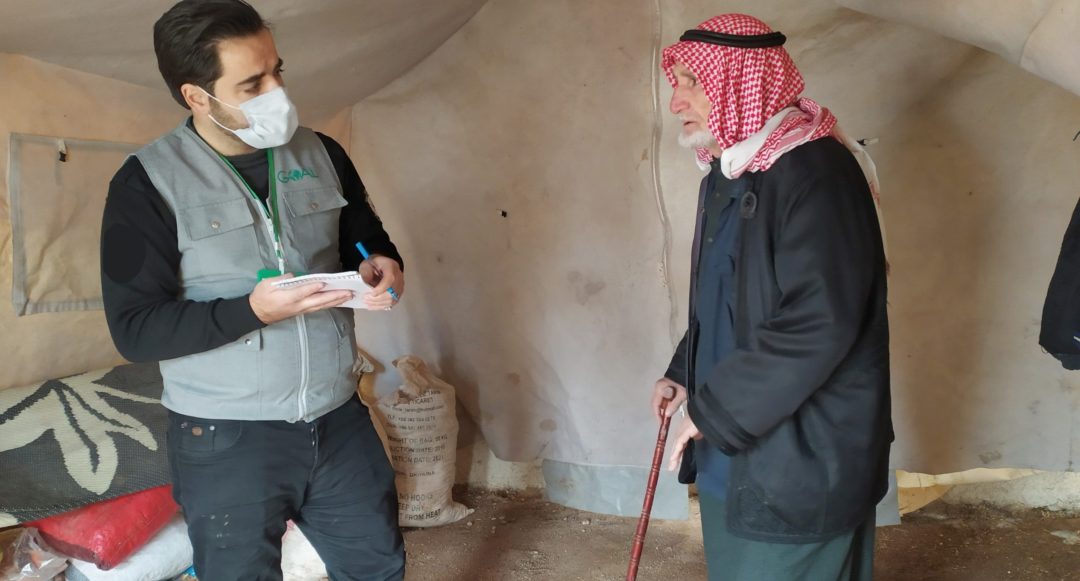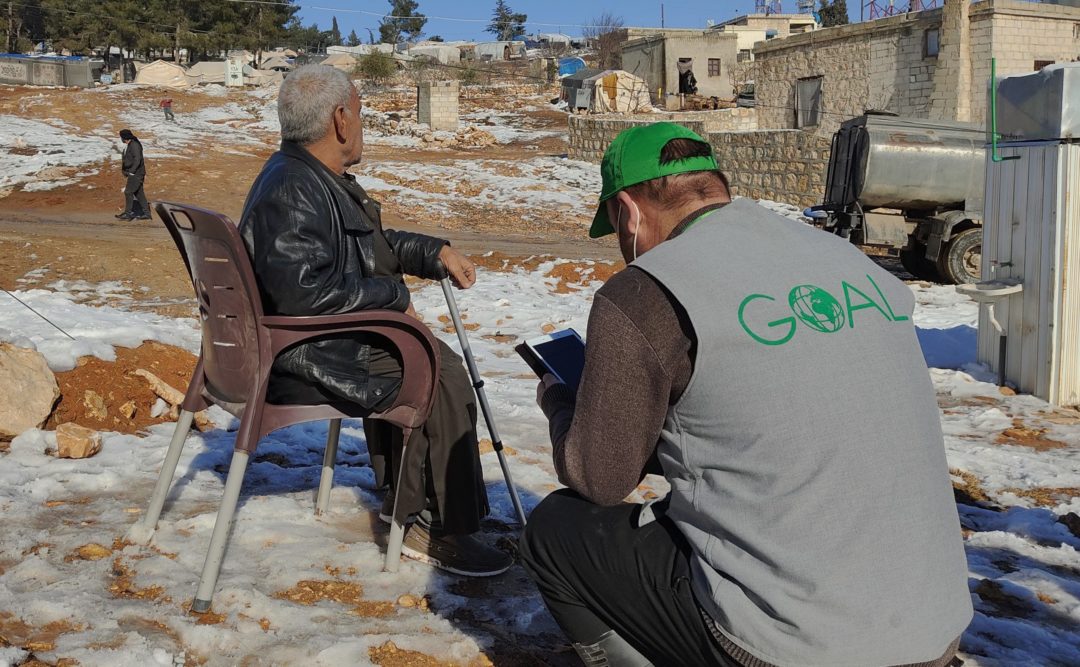 Blogs
Blogs
March 15, 2022 • 5 min read
by Nebras Haj Hamdan and Kasem Hijazy, Area Coordinators, GOAL Syria
This was the tenth straight winter millions of Syrians have spent far from their homes or loved ones, with no sight of spring on the horizon. Among them are displaced families residing in camps in Northern Aleppo who lost their young children to the freezing cold, unable to reach healthcare fast enough to save them from the grip of treatable respiratory diseases. Widowed women in Idleb who are having to tell their daughters that their father will return home one day, and reunite with them to brace winter together again. Young people driven across international borders by the conflict and the lack of livelihoods, to countries nearby and afar, unsure if they will ever see again the siblings, parents, and grandparents they have had to leave behind.

GOAL emergency response teams helping residents of Harsh Qatma Camp in Northern Aleppo clear their tents after a snowstorm.
It was 11 years ago this week that this crisis began. It was hard to imagine then, in the spring of 2011, even after protests by the growing masses of people who took to the streets across the country to call for a “Syrian revolution to achieve freedom and justice” were violently quashed, that our homeland would be in this state a mere decade later. That Syria would make history books as the new century’s first, and so far longest, “protracted humanitarian situation.”
Yet the wounds have not healed with the passing of time. Today, statistics about the civilians who lost their lives in the conflict or about those who were disabled due to indiscriminate attacks, on the large number of hospitals, schools, and water stations which were damaged or even demolished in targeted air raids, or on the growing population of those who have been forcibly displaced within Syria and across international borders can tell little anymore of the pain that has been inflicted, or the severe but increasing humanitarian needs.
We have both been with GOAL’s Syria Programme from the very start, having joined the organisation soon after its humanitarian assistance activities in Idleb began in late 2012. We had experienced displacement ourselves before taking up our roles within the emergency response in the region, designed to deliver essential aid to those who had fled to areas in Syria’s northwest border zones to escape attacks on their villages or neighbourhoods – just like our own families.
The smiles of the families we serve strengthen us
We have been honored to help lead the expansion of GOAL’s assistance programming on the ground, providing support to water stations and bakeries in new communities in Idleb, and later in Northern Aleppo, to reach more conflict-affected and vulnerable families with clean piped water and subsidized bread as well as food aid and core relief items. We have contributed to the planning of new humanitarian programmes in emergency response, nutrition assistance, and shelter support, having witnessed the damage displacement camps set up on agricultural land suffered from floods and snowstorms every year, the malnourished children whose mothers could not afford to take them to the region’s few remaining healthcare centers, and the tens of thousands of people who could only seek some comfort under branches of olive trees after escaping the intense wave of attacks between December 2019 and May 2020, as camps and collective centres could not accommodate the more than 1 million people who were displaced within the span of five months.

GOAL emergency response teams assess needs in Habat al-Baraka Camp in Sharan Subdistrict in Northern Aleppo after snowstorms
The smiles we see every day on GOAL’s programmes’ beneficiaries faces motivate us and our brave, tireless field-based colleagues to do more for Syria’s conflict-affected communities, and we are proud that GOAL is now reaching more than 1.5 million people in Idleb and Northern Aleppo with vital humanitarian aid and support every year. Yet this is nowhere near being enough. The compounding impacts of the economic crisis, the Covid-19 pandemic and the losses in income opportunities it has caused, the recent droughts which have made agricultural production all but impossible, and the sudden decline in the availability of healthcare and education services driven by cuts in humanitarian funding have pushed people in Syria even closer to the edge.
Today, after 11 years of conflict, families who cannot access food are finding no other respite than to marry their daughters at even younger ages or to send their school-aged sons to seek informal but heavy labour. Diseases that are largely preventable and commonly treatable are wreaking havoc in camps and villages that are not served by a source of clean water. Hospital beds are full of children who inhaled smoke from the plastic waste their families had to burn as heating fuel to survive the bitter cold.
Facilitating a transition to peace
As humanitarians we cannot help but wonder for how long this situation can be allowed to go on. And as Syrians who still have great hopes for the future of their homeland, we refuse to believe that this bleak image of destruction and need should continue to represent our country.
The people of Syria have withstood incredible levels of pain, loss, and destruction, but much more should be done to support their resilience. Our families, neighbours, and communities have grown tired of being defined as passive recipients of aid. It is time for the international community to help facilitate a transition to peace, reinforced by early recovery and livelihoods support programmes which can revitalise the economy and give people a chance to participate in the process of rebuilding their country. We, the humanitarians of Syria, will be ready to help.
You can support GOAL’s work in Syria with a donation today.

GOAL emergency response teams assessing needs in Harsh Qatma Camp in Sharan Subdistrict in Northern Aleppo after heavy snowfall.
